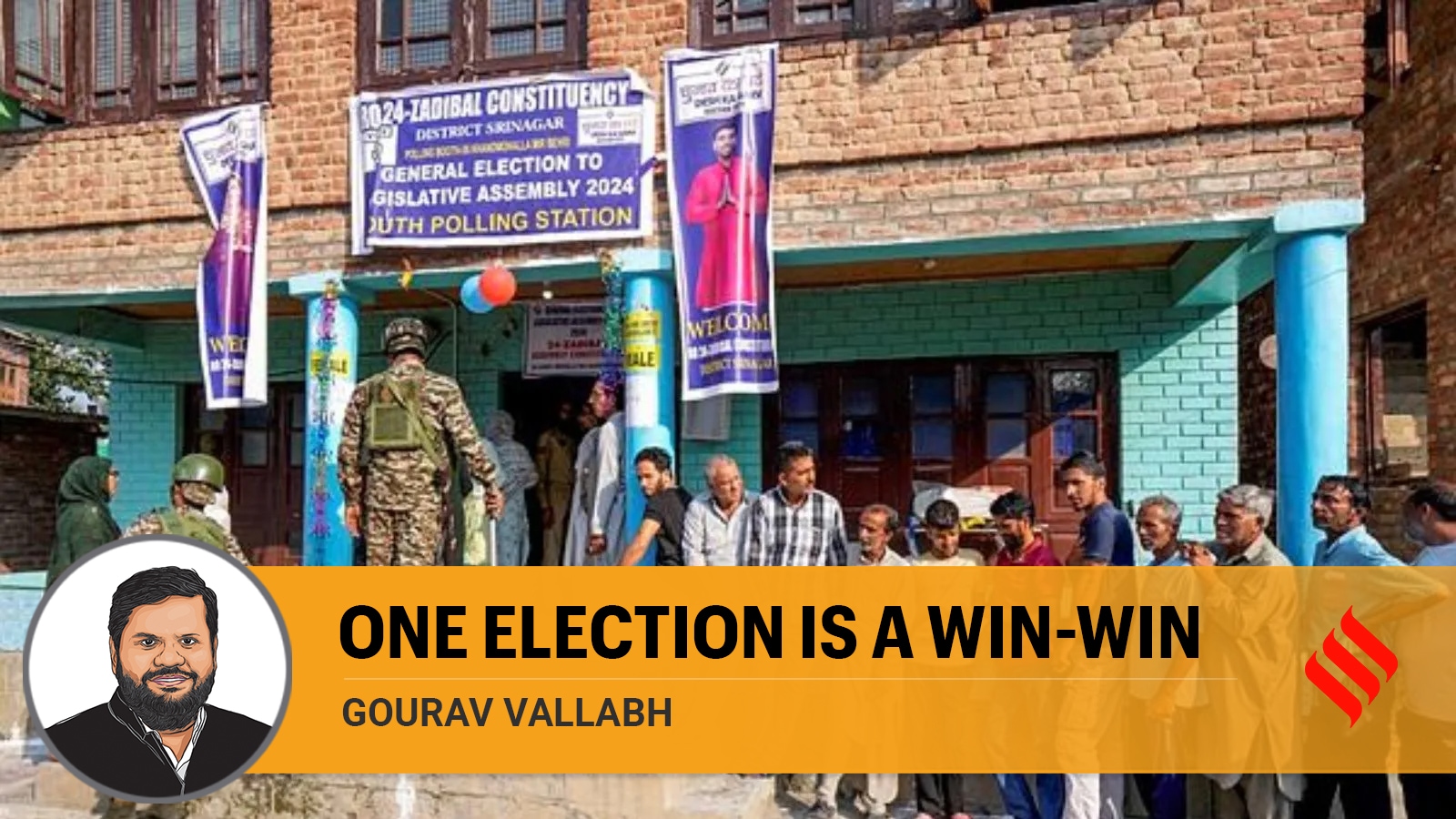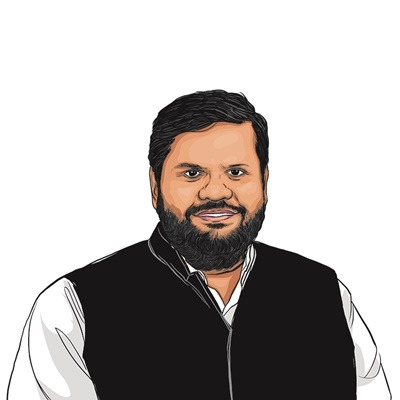Opinion For a more efficient and responsive democracy, we need One Nation One Election
Frequent polls have led to voter fatigue, increased financial burden on government, uncertain policy environment. One Nation One Election can solve these problems
 Voters stand in a queue at a polling station to cast votes during the second phase of Jammu and Kashmir Assembly elections, in Srinagar district. (PTI Photo)
Voters stand in a queue at a polling station to cast votes during the second phase of Jammu and Kashmir Assembly elections, in Srinagar district. (PTI Photo) India is a modern-day exemplar of democratic values. Elections are crucial to the democratic process. However, the country is always in election mode because of the existing staggered nature of polls. Politicians are diverted from their core duty of governing, and the system is severely strained, financially and administratively. The proposed reform of One Nation, One Election (ONOE) seeks to overcome these issues, drastically altering how elections are held and how governance can be streamlined in our country. This reform will not only reduce the financial burden on the government but also allow citizens to focus on their daily lives without the constant political upheaval.
A critical problem with the current electoral system is the distraction it creates for the political class and the electorate. Leaders often prioritise short-term political gains over long-term administration because elections are held somewhere in the country practically every few months. This ongoing political focus takes attention away from the greater purpose of national development, particularly in a country like India, where long-term initiatives and policies are essential for progress.
The relentless cycle of elections leaves little room for citizens to critically reassess or evolve their political ideologies. Just as they settle back into their daily lives after a municipal election, they are thrust into state assembly polls, followed soon after by Lok Sabha elections. This constant barrage keeps them locked into familiar voting patterns. The need for change is palpable, and ONOE could be the solution to break this cycle and allow for greater political reflection.
The financial strain of conducting multiple elections within a short time frame is a significant concern, with the overall election expenditure soaring. From Rs 9,000 crore in 1998, it has increased sixfold to about Rs 55,000 crore in 2019. The total estimated expenditure for the 2024 elections is expected to reach a staggering Rs 1.35 lakh crore, surpassing the spending in the 2020 US elections, which stood at Rs 1.2 lakh crore. In all state elections, the expected amount spent can go up to Rs. 1.7 lakh crore (assuming 40 per cent over the general election) for one election cycle. This economic burden is a stark reminder of the need for reform. The government alone had spent more than Rs 15,000 crore to conduct the 2019 Lok Sabha election, a sharp increase from Rs 3,800 crore in 2014. Such exorbitant costs heavily burden public finances, diverting funds from critical areas like infrastructure, healthcare, and education. Studies suggest that by holding elections simultaneously, the government alone could significantly reduce these duplicate costs, potentially saving between Rs 7,500 and Rs 12,000 crore per election cycle.
The uncertainty caused by regular elections in the business climate is another often-overlooked effect. Political unpredictability brought on by frequent elections shatters policy continuity, which makes companies hesitant to commit to long-term projects or expansion plans. Sectors that heavily depend on labour and supply networks are especially susceptible to these disruptions. Election synchronisation would give businesses the stability they need to make long-term plans more confidently. This, in turn, would enhance economic growth and allow India to become a more attractive destination for both domestic and international investors.
Regular elections also strain the nation’s security and administrative agencies. Teachers, government workers, and security personnel are taken away from their primary duties to oversee the election process during election seasons. Public services like education become inefficient since schools are frequently closed to make room for voting booths. Additionally, law enforcement organisations are overburdened and concentrating more on election-related tasks than upholding public safety and internal security. A synchronised election cycle would relieve this pressure.
Another issue with the current electoral system is voter turnout. Voter turnout has decreased recently despite the significance of elections. Election turnout for the Lok Sabha in 2024 was 65.79 per cent, down from 67.40 per cent in 2019. Voter fatigue is evident in this reduction since residents are frequently asked to cast multiple ballots in state elections that are spaced out. Election participation would probably increase if ONOE coordinated state and general elections. According to historical data, election turnout tends to rise during simultaneous elections, as seen by the 1999 Karnataka and Andhra Pradesh elections, where turnout increased by 11.5 per cent. Aligning elections would ensure that citizens are more engaged in a single, unified electoral process.
A commonly expressed apprehension about ONOE is the possible exclusion of state-level concerns and groups. According to critics, simultaneous elections might divert attention from regional issues and favour national parties while marginalising local voices. Indian voters’ previous voting patterns seem to indicate otherwise. In the 1989, 1991, and 1996 parallel elections in Tamil Nadu, voters showed that they could tell the difference between national and state elections by selecting different parties for the Assembly and Lok Sabha elections. Since national parties would have to handle regional issues alongside their own, ONOE could promote greater engagement with local issues instead of marginalising regional parties.
Countries worldwide, including Brazil, the Philippines, and Honduras, have adopted some form of simultaneous elections, demonstrating that this model is practical and effective. These nations have simultaneously seen the benefits of holding elections at multiple levels, including reduced costs, improved voter turnout, and more efficient governance. With its sizable electorate and intricate political structure, India stands to benefit much more from a system like this. Once put into practice, the improvements in budgetary discipline, political engagement, and governance would significantly exceed any practical difficulties.
India has continuously shown itself to be a creative and adaptable democracy. By adopting the revolutionary idea of ONOE, India can take a step toward becoming a fully developed country and a “Viksit Bharat,” where governance is effective, responsive, and focused on the needs of the people rather than the demands of the election calendar.
The writer is a professor at XLRI and is with the BJP



